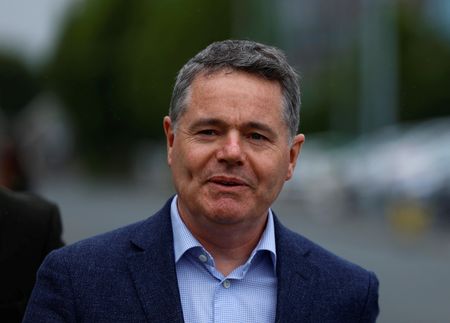By Tommy Reggiori Wilkes
LONDON (Reuters) – Britain and the European Union must turn their “first steps” to rebuild trust into a “steady walk” as they confront common challenges, the president of the Eurogroup of euro zone finance ministers said on Tuesday.
Addressing representatives of Britain’s financial industry, Paschal Donohoe said his discussions with UK finance minister Rachel Reeves included pensions system reform and unlocking longer-term savings to boost capital markets, as well as the euro zone’s drive for an elusive capital markets union.
“Of course, the UK and EU each have to make their own decisions about how to make progress. However, it is really welcome that we have moved onto a new footing in our relationship which allows us to exchange views on these important topics for our citizens and businesses,” he said.
“More broadly, I strongly welcome the UK Government’s intention to strengthen and deepen relations with the EU,” Donohoe, an Irish government minister, told an audience at the medieval Guildhall, home of the City of London Corporation.
Britain’s Prime Minister Keir Starmer has sought to reset relations with the EU since coming to power this summer, with improved ties at the heart of his efforts to boost Britain’s economic growth.
Donohoe said he welcomed the UK-EU Memorandum of Understanding on Financial Services, signed last year, which enabled meetings of the Joint EU-UK Financial Regulatory Forum.
In a speech titled ‘Financing Our Future’, the Eurogroup president said progress on a euro zone capital markets union was vital.
“At a time of growing dissatisfaction about the role of market-based solutions and at a time of such widespread budget challenges, making further progress on Capital Markets Union is essential,” he said.
Recent work between member states signalled “a sea change in attitudes and political determination”.
“To play the ‘devil’s advocate’, without a true capital markets union in Europe, I think the green transition as one prime example, is far less likely to happen,” he told the audience in London.
(Reporting by Tommy Reggiori Wilkes, editing by Sinead Cruise and Christina Fincher)





